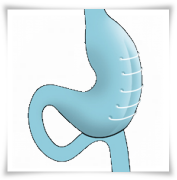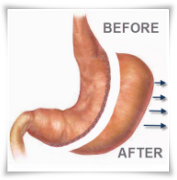Downsides to Gastric Sleeve Surgery
Understanding the possible downsides to gastric sleeve surgery is critical.
If you are suffering from obesity, the gastric sleeve can help you eliminate that excess weight, but like any surgery, there are upsides and downsides to gastric sleeve surgery.
On this page we will help give you more insight to the downsides to gastric sleeve surgery. Some of the downsides to gastric sleeve surgery include side effects such as leakage, as well as unwanted effects like stomach stretching and weight regain.
Click here to read about the Advantages Of Gastric Sleeve Surgery.
An Overview of The Procedure
The gastric sleeve can be done laproscopically, through tiny incisions. Your bariatric surgeon will insert a tiny camera into the small incision, and using tools, also inserted through the tiny holes, they will remove a big portion of your stomach, up to 85% of it. The remaining stomach will be formed into a tube or a sleeve, and will then be sealed up using surgical staples. There are a huge number of health benefits to this procedure, but there are also some possible downsides to gastric sleeve surgery.
Downsides to Gastric Sleeve Surgery – Overview
 Downsides to gastric sleeve surgery do exist, but the benefits are also numerous. However, you still need to be aware of the disadvantages.
Downsides to gastric sleeve surgery do exist, but the benefits are also numerous. However, you still need to be aware of the disadvantages.
Here is list of the possible downsides to gastric sleeve surgery:
- Permanent Solution
- Leakage
- Stomach Stretching
- Weight Regain
- Insurance Coverage
Downsides to Gastric Sleeve Surgery
PERMANENT SOLUTION
This is the very first, and most important of the downsides to gastric sleeve surgery, it is permanent. More than 60 percent of the stomach is removed permanently, and once it’s been done, it is irreversible. The stomach tissue removed cannot be put back. Many people see this as one of the most significant downsides to gastric sleeve surgery, and this is probably the single most important factor that patients considering bariatric surgery will take into account. Other restrictive procedures, such as the gastric band, or the gastric balloon, involve inserting an apparatus into the body that will reduce the size of the stomach, but these procedures can be reversed when the apparatus is removed. The gastric sleeve procedure is a permanent alteration to the stomach.
LEAKAGE
As you’ve read above, and on other pages of this site, up to 80% of the stomach is taken out during the gastric sleeve procedure. The new stomach that is left is sealed up using surgical staples. You should be aware that there is the possibility that the sealed stomach can leak along the seal. Even though leakage is rare, it can be one of the more uncomfortable downsides to gastric sleeve surgery. These fluid leaks often are often the source of infection and it may also cause some health threatening problems. If you undergo the procedure, you must remain in the surgeon’s care for at least 48 hours to ensure the tissue heals properly. If your stomach hurts, or you suspect that there may be some type of complications, you should see your bariatric surgeon immediately.
STOMACH STRETCHING
Stretching of the stomach is another one of the downsides to gastric sleeve surgery. The stomach tissue can stretch out after a few years and this will be the reason why the weight that has been lost will again be regained. The gastric sleeve does not have a device inserted in the stomach to stop it from expanding. The way the gastric sleeve works is that it reduces the size of the stomach which limits your food intake. This limit will result in weight loss.
The 2 things that can cause stomach stretching are: Overeating and Eating too often. If you do either (or both) of these things, it will cause the stomach tissue to stretch, which will increase the amount of food you are able eat. This completely defeats the purpose of the gastric sleeve. Not only that, it is a waste of you time, and your money. This is one of the more commonly experienced downsides to gastric sleeve surgery.
It is extremely important that you stick to your prescribed diet, and make it a habit to stay on course. This is where behavior modification will come in, to help you learn to eat less without thinking about it, or making a conscious effort to eat less. Behavior modification will help you to eat less without realizing it. If you don’t control your eating habits, you may experience one of the more common downsides to gastric sleeve surgery which is stomach stretching.
WEIGHT REGAIN
Another one of the possible downsides to gastric sleeve surgery is gaining the weight back. Eating a lot of high calorie foods and excessive snacking will eventually make the gastric sleeve ineffective. As we mentioned above, overeating or eating too often can cause the stomach to stretch. In addition, if you are eating unhealthy, high calorie, sugary foods, you run the risk of putting back on that excess weight that you have lost. The gastric sleeve diet requires you to eat healthy. Since your food intake is limited, you had better make sure that the food you do eat is healthy, otherwise you may regain the weight you lost, which is definitely one of the downsides to gastric sleeve surgery that you want to avoid.
INSURANCE COVERAGE
The last of the downsides to gastric sleeve surgery has to do with the insurance coverage. Gastric sleeve surgery is hardly ever covered by insurance providers since this process is still considered an “experimental” procedure. This simply means that the insurance provider will not cover any of the costs for the procedure and so as a patient you will be paying the entire treatment out of your own pocket. The common charge for the gastric sleeve ranges from $ 8,000 and above. This for most people is too expensive. Keep in mind that not every insurance provider is the same. This is not a major disadvantage, but it is still one of the downsides to gastric sleeve surgery, because some insurers are beginning to offer coverage for bariatric surgery, so the best advice here is to contact your insurance provider to find out which bariatric procedure they cover, and if so, what is needed for you to qualify. If you can qualify for coverage, then you will be able to reduce the cost and avoid this downsides to gastric sleeve surgery.
There are a number of health benefits to the gastric sleeve, but there are also downsides to gastric sleeve surgery. If you are considering bariatric surgery to help you lose weight, speak to your doctor to get all the facts, benefits and downsides to gastric sleeve surgery.

